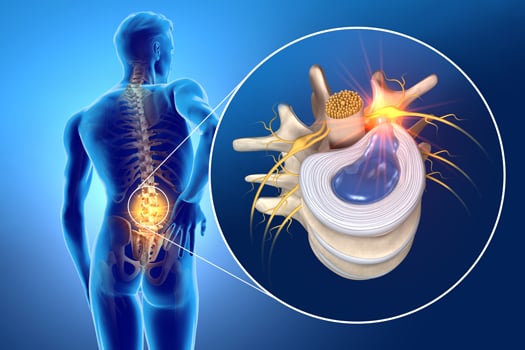
It is not unusual to develop a herniated disc. While some people with spinal disc issues seek treatment soon after noticing symptoms, others may prefer to hold off on treatment for a variety of reasons. This article goes over the potential long-term effects of herniated spinal discs to give you a better idea of why it is best to seek treatment sooner rather than later.
Pain May Go Away
In some instances, a herniated spinal disc may naturally shift over time. If this happens, you may notice a gradual decrease in discomfort. Whether this occurs primarily depends on where the disc is located and how much inner disc material is protruding. It also depends on how nearby nerves are affected.
On a related note, herniated disc pain often goes away or becomes manageable after a few weeks or so. This is why it is generally recommended to see how the herniated disc pain develops once you start to notice it. The only exception is if your symptoms are extremely severe or potentially life-threatening.
Daily Quality of Life Can Be Affected
A herniated spinal disc producing nerve-based symptoms can have a significant impact on your daily quality of life. This could involve having difficulty performing daily tasks or work-related duties, especially if you have a more physically demanding job. Additionally, you may experience the following issues:
• Difficulty sleeping
• Mobility issues
• An inability to enjoy your favorite activities
• Muscle weakness
The Affected Nerve May Be Permanently Damaged
If a spinal nerve is compressed long enough, the damage to the nerve may become irreversible. While nerve roots are fairly durable and resilient, long-term compression can still take a toll on the affected nerve. Even with short-term nerve compression, the affected nerve may still need some time to heal and recover.
With long-term nerve compression due to a herniated disc, nerve signals may become disrupted to such a degree that they never return to their normal pattern. Additionally, nearby nerves may be affected due to the resulting inflammation. This can be problematic if you have radiating nerve pain. If the sciatic nerve is involved, this could mean living with leg pain on a fairly long-term basis.
You Should See a Doctor if Pain Persists
If your discomfort does not go away after 4–6 weeks, it is best to see a doctor to get an accurate diagnosis. Often, it is possible for a doctor to make an initial diagnosis based on the nature of your symptoms. However, you may still be referred to a spine specialist for further testing if there is some uncertainty about what may be causing your discomfort.
If a herniated disc is the issue, the good news is many patients benefit from nonsurgical treatments. These may include:
• Physical therapy
• Activity modification
• Medication
• Posture adjustments and exercises
If you have a herniated disc that is not responding to conservative treatment, a discectomy or less invasive microdiscectomy may be discussed and potentially recommended. Although this is generally one of the most successful back surgery procedures, having a large hole in the outer ring of the disc more than doubles the risk of needing another operation. A new treatment, Barricaid, is a bone-anchored device that closes this hole, and 95 percent of Barricaid patients did not undergo a reoperation due to reherniation in a 2-year study timeframe. This treatment is done immediately following the discectomy—during the same operation—and does not require any additional incisions or time in the hospital.
If you have any questions about the Barricaid treatment, ask your doctor or contact us at 844-288-7474.
For full benefit/risk information, please visit: https://www.barricaid.com/instructions.


Comments